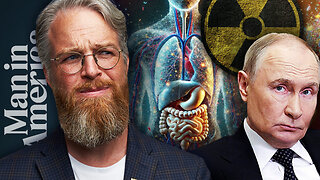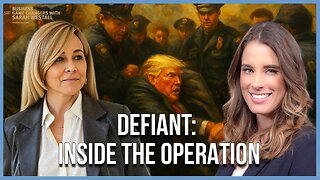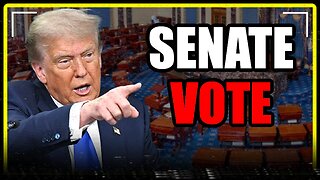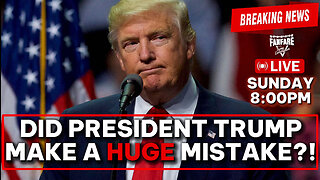Premium Only Content

Who is the W.H.O. & What are they Doing - Prof Robyn Cosford
World Health Organisation Masterclass with Prof Robyn Cosford - brought to us via the Australian Medical Network - https://australianmedicalnetwork.com/
For further actions and information on opposing these W.H.O. changes go to - https://australiaexitsthewho.com/
This is a discussion about the proposed changes to International Health Regulation (2005) (IHR- 2005) and the proposed acceptance of W.H.O. ‘Pandemic Treaty’.
The current working draft of the Pandemic Treaty is known as the ‘Zero Draft’
Both these instruments come as a result of strategic planning by the W.H.O.
The Pandemic Treaty is a parallel and complimentary entity to the IHR-2005. The IHRs are a broad framework for international health cooperation and are adopted by member states and led by the World Health Assembly (WHA) the governance body of the WHO.
One important difference between the IHR-2005 and the proposed Pandemic Treaty is that the IHR only need 51% voting majority to be accepted and legally bind all the member nations where as the Pandemic Treaty requires a 2/3 majority which last year failed to be obtained.
The following information and potential remedial actions are time critical with the 21 – 30 May 2023 being the date for the 76th World Health Assembly (WHA) meeting that will continue ratifying the changes and drafting process for the proposed amendments to the IHR-2005 and Pandemic Treaty.
The 77th WHA meeting then takes place in May 2024.
At the 75th WHA meeting we had the following delegates listed:
Chief delegate - Professor P. Kelly Chief Medical Officer, Department of Health and Deputy Chief Delegate - Ms A. Gorely, Ambassador, Permanent Representative, Geneva (there were also a list of potential advisors and alternate or supplementary delegates).
Key Concerns Over Proposed Amendments to the International Health Regulations (2005) (IHR – 2005)
1. Change from Advisory to Mandatory proclamations: Change the overall nature of the World Health Organization from an advisory organization that merely makes recommendations to a governing body whose proclamations would be legally-binding.(Article 1 and Article 42)
2. Potential Rather than Existing or Emerging Emergencies: Greatly expand the scope of the International Health Regulations to include scenarios that merely have a “potential to impact public health.” (Article 2)
3. Disregard for Dignity, Human Rights and Freedom: Seek to remove “respect for dignity, human rights and fundamental freedoms of people.” (Article 3)
4. Allocation Plan/ Power Over Resources: Give the Director General of the WHO control over the means of production through an “allocation plan for health products” to require developed states parties to supply pandemic response products as directed. (Article 13A)
5. Mandatory Medical Treatments: Give the WHO the authority to require medical examinations, proof of prophylaxis, proof of vaccine and to implement contact tracing, quarantine and treatment. (Article 18)
6. Global Health Certificates: Institute a system of global health certificates in digital or paper format, including test certificates, vaccine certificates, prophylaxis certificates, recovery certificates, passenger locator forms and a traveler’s health declaration. (Articles 18, 23, 24, 27, 28, 31, 35, 36 and 44 and Annexes 6 and 8)
7. Loss of Member Nation Sovereignty: Would empower the Emergency Committee to override decisions made by sovereign nations regarding health measures and would make the Emergency Committee’s decisions final. (Article 43)
8. Unspecified, Potential Large Financial Costs: Redirect unspecified billions of dollars to the Pharmaceutical Hospital Emergency Industrial Complex with no accountability. (Article 44A)
9. Censorship: Greatly expand the World Health Organization’s capacity to censor what they consider to be mis-information and dis-information. (Annex 1, page 36)
10. Obligations of Duty to Cooperate: Creates an obligation to build, provide and maintain IHR infrastructure at points of entry. (Annex 10)
Key Concerns Over W.H.O. Proposed Pandemic Treaty
1. The WHO wants control: Three separate times the WHO attempts to assert its desire to gain additional authority by usurping the sovereignty of the member nations. (Pages 4, 12 and 22)
2. Common but differentiated responsibilities: Each nation would receive only one vote, and all nations would be legally bound by the obligations of the WHO CA+, but some nations would be required to do and provide more than others in unspecified ways. (Page 11)
3. WHO global pandemic supply chain and logistics network: The WHO would be empowered to determine, control and direct the global supply of pharmaceutical products and all nations would be legally obligated to obey their dictates. (Page 13)
4. Speed up regulatory approval of drugs: Nations would be obligated to decrease the time required to approve new drugs, regardless of issues regarding safety and effectiveness. (Page 15)
5. Support for ‘Gain of Function’ research: Nations would be encouraged to engage in “innovative research and development for addressing novel pathogens” while ensuring that regulatory standards “do NOT create any unnecessary administrative hurdles for research.”(Page 16)
6. Pathogen Access and benefits sharing system: The WHO wants to be in control of “all pathogens with pandemic potential, including their genomic sequences, as well as access to benefits arising there from.” The WHO also wants to receive “real-time access to 20% of the production of... pandemic-related products.” (Pages 17-18)
7. Attempts to justify restriction of unalienable human rights: The WHO is attempting to rebrand isolation, restrictions and quarantines as “Protection of Human Rights.” (Page 21)
8. Censorship: The WHO wants to increase funding to “tackle false, misleading, misinformation or disinformation,” “managing infodemics through... social media” and “to counteract misinformation, disinformation and false news.” (Page 23)
9. Large unspecified costs: The WHO CA+ would require tens of billions of dollars to be spent during inter-pandemic times on products that would provide dubious health benefits but consistent profits for the Pharmaceutical Hospital Emergency Industrial Complex. (Pages 25-26)
10. Additional bureaucracy: The Conference of the Parties (COP) would create yet another enormous bureaucracy to be ruled over by two Presidents and 4 Vice-Presidents. (Pages 26-27)
Due to the complexity of various terms and groups we have also included a brief guide below on who and what the IHR, WHA, IHRRC, WGIHR and INB are. They are all really inter-linked parts, committees or groups of the W.H.O. and ultimately the United Nations (UN).
World Health Assembly (WHA) (https://www.who.int/about/governance/world-health-assembly )
The World Health Assembly is the decision-making body of WHO. It is attended by delegations from all WHO Member States and focuses on a specific health agenda prepared by the Executive Board. The main functions of the World Health Assembly are to determine the policies of the Organization, appoint the Director-General, supervise financial policies, and review and approve the proposed programme budget. The Health Assembly is held annually in Geneva, Switzerland.
International Health Regulations (2005) (IHR – 2005)
(https://www.health.gov.au/topics/communicable-diseases/biosecurity/international-obligations )
The International Health Regulations (2005) (IHR - 2005) provide an overarching legal framework that defines countries’ rights and obligations in handling public health events and emergencies that have the potential to cross borders.
The IHR are an instrument of international law that is legally-binding on 196 countries, including the 194 WHO Member States. They create rights and obligations for countries, including the requirement to report public health events. The Regulations also outline the criteria to determine whether or not a particular event constitutes a “public health emergency of international concern”.
International Health Regulations (2005), 3rd ed. World Health Organization - https://apps.who.int/iris/handle/10665/246107 this is the formal document outlining health regulations binding member states.
International Health Regulations Review Committee (IHRRC) (https://www.who.int/teams/ihr/ihr-review-committees )
International Health Regulations Review Committee (IHRRC) report and make recommendations to the Working Group on proposed amendments to the International Health Regulations (2005) (WGIHR).
The technical recommendations formulated by this Review Committee will inform the work of the Member States Working Group on Amendments to the International Health Regulations (2005) (WGIHR). In accordance with the same decision, the first meeting of the WGIHR was convened on 14-15 November 2022 and the WGIHR will present its proposed amendments to the IHR for consideration by the Seventy-seventh World Health Assembly in 2024.https://www.who.int/teams/ihr/ihr-review-committees/review-committee-regarding-amendments-to-the-international-health-regulations-(2005)
Working Group on Amendments to the International Health Regulations (WGIHR) (https://apps.who.int/gb/wgihr/ )
As the title suggest a working group dedicated to potentially negatively or positively modifying the IHR (2005) binding member states.
Intergovernmental Negotiating Body (INB) (https://inb.who.int/ )
The WHA has currently formed Intergovernmental Negotiating Body (INB) is the working group developing recommendations for consideration by the World Health Assembly in regard to a new form of ‘Pandemic Treaty’
In December 2021, at its second-ever special session, the World Health Assembly established an intergovernmental negotiating body (INB) to draft and negotiate a convention, agreement or other international instrument under the Constitution of the World Health Organization to strengthen pandemic prevention, preparedness and response i.e. a ‘Pandemic Treaty’
INB comprises of representatives from Brazil (Tovar da Silva Nunes), Egypt (Ahmed Soliman), Japan (Kazuho Taguchi), Netherlands (Roland Driece), South Africa (Precious Matsoso), and Thailand (Viroj Tangcharoensathien). The two co-chairs of the INB are Roland Driece (Netherlands) and Precious Matsoso (South Africa).
-
 14:12
14:12
BlabberingCollector
20 hours agoHBO Show Update, Audible Full Cast Ensemble Updates, Wizarding World Quick Hits!
27.3K1 -
 LIVE
LIVE
Lofi Girl
2 years agoSynthwave Radio 🌌 - beats to chill/game to
302 watching -
 31:30
31:30
The Why Files
7 days agoCodex Gigas | The Devil's Bible and the Nazi Hole to Hell
185K82 -
 1:05:26
1:05:26
Man in America
20 hours ago“Poseidon” Doomsday Sub, Microplastics & The War on Testosterone w/ Kim Bright
106K9 -
 1:05:57
1:05:57
Sarah Westall
12 hours agoThe Story the DOJ, the FBI and the Media doesn’t want you to Know w/ Christina Bobb
63.3K11 -
 2:16:01
2:16:01
IsaiahLCarter
1 day ago $19.94 earnedGraham Linehan: A Mess of Courage and Conviction || APOSTATE RADIO 034
44K1 -
 2:03:29
2:03:29
Tundra Tactical
13 hours ago $18.45 earned🛑LIVE NOW!! Honest Gun Company Slogans Gun Mad Libs and Much More
42.2K2 -
 4:54:33
4:54:33
MattMorseTV
14 hours ago $299.11 earned🔴Senate VOTES to END the SHUTDOWN.🔴
175K265 -
 2:55:39
2:55:39
Barry Cunningham
1 day agoBREAKING NEWS: DID PRESIDENT TRUMP MAKE A HUGE MISTAKE? SOME SUPPORTERS THINK SO!
69.5K45 -
 7:50:44
7:50:44
SpartakusLIVE
12 hours agoSOLOS on WZ || #1 Challenge MASTER is BACK in Verdansk
60.3K3